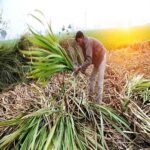As preparations for the 2025-26 sugar season gain momentum, the sugar industry is emphasizing the need for timely approvals on sugar exports and clear directives on sugar diversion for ethanol production. Industry leaders stress that such measures are vital for the long-term sustainability of sugar mills and the sector as a whole.
While speaking to ChiniMandi about the timely approval of sugar exports and clear directives on sugar diversion for ethanol production for the upcoming season, Tarun Sawhney, Vice Chairman & Managing Director of Triveni Engineering and Industries Ltd (TEIL), said, “At Triveni Engineering & Industries Ltd., we believe that clear communication regarding sugar exports and ethanol is essential for the long-term sustainability of India’s sugar industry. These decisions are not just about balancing supply and demand; they play a vital role in ensuring that mills can generate stable cash flows, make timely payments to farmers, and reinvest in modernisation and ethanol production. During years of high sugar output, delays in communicating policy guidelines regarding sugar export and ethanol diversion can lead to an oversupply of sugar in the domestic market, which depresses prices and limits the industry’s ability to contribute to rural incomes and India’s clean energy objectives. Predictable timelines and synchronised announcements can prevent such imbalances and enable proactive management of sugar, exports, and ethanol.”
The sugar industry is urging the government to raise the price of ethanol and the Minimum Selling Price (MSP) of sugar to reflect the recent hikes in the Fair and Remunerative Price (FRP) of sugarcane. In June 2018, the Indian government set the MSP of sugar for the first time at Rs 29 per kg when the FRP for sugarcane was Rs 255 per quintal. Since then, while the FRP has steadily increased, rising to Rs 355 per quintal for the 2025-26 season, the MSP of sugar has remained unchanged at Rs 31 per kg since February 2019.
Sawhney highlighted the broader challenges facing the industry and the need to increase the MSP of sugar. “Furthermore, pricing and crop resilience are also some of the long-standing concerns that must be addressed. Sugar prices have broadly stagnated for five years, while production costs have surged. With the Fair and Remunerative Price (FRP) of sugarcane at Rs. 355 per quintal, it is crucial to revise the MSP of Sugar to Rs. 39.14 per kg to restore the viability of mills and ensure fair returns for farmers. Agronomic challenges, such as red rot affecting the Co-0238 variety, underscore the urgent need to invest in resilient crop varieties. Furthermore, upward revising ethanol prices for B-heavy and juice-based feedstocks would help alleviate pressures within the value chain. Therefore, establishing a forward-looking framework that aligns export approvals, diversion targets, MSP, and ethanol pricing is essential for ensuring mill sustainability, strengthening rural livelihoods, and reinforcing India’s global leadership in sugar and bio-energy,” he added.
ISMA has recently released its first preliminary sugar production estimate, which indicates an 18 percent increase in gross sugar production (before diversion), reaching around 349 lakh tons, compared to 295 lakh tons produced last year.

















